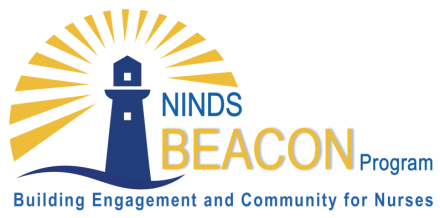
The BEACON Program is a career consortium sponsored by the NINDS Clinical Director aimed at developing strategies to provide improved support and enhanced inclusion for NINDS intramural nurses in the areas of professional development, communication, collaboration, and mentorship.
The Program consists of five components:
- Onboarding and Orientation
- Career Development
- Nursing Career Forum
- Enhancing Recognition
- Stay and Exit Interviews
For more program information contact Kaitlyn Benson at kaitlyn.benson@nih.gov. NINDS staff can also access recordings of past guest speakers on the NINDS Intranet (staff login required).
Onboarding and Orientation
Onboarding:
To support the pre-boarding process, a NINDS nurse, recognized as a subject matter expert, assists the NINDS principal investigators and staff in all phases of position development, advertising, and hiring of RNs and NPs, liaisons with administrative staff and the NIH Office of Human Resources to answer questions and help expedite the process, and provides coordinated internal guidance for position related questions and hiring.
Orientation:
To facilitate the onboarding process, the Program will 1) implement meet and greets with other nurses, the Clinical Director, and NINDS staff, 2) provide introductions at Clinical Care meetings and in the Clinical Neuroscience Program (CNP) newsletter, 3) share information related to NINDS participatory activities such as NINDS Grand Rounds, NINDS Clinical Care meetings, and Thursday consult rounds. Continued communication will foster ongoing inclusion in the NINDS community.
Career Development
Mentorship:
To ease the onboarding process and support career development, new RNs and NPs will be assigned a peer mentor for their first 6 months of employment. This will aide newly hired nurses in becoming more acquainted with staff, policies, and processes in NINDS and the NIH Clinical Center. The Program will ask for experienced (>1 year) nursing staff to volunteer to be peer mentors to new nurses.
Training & Development:
The Program will work with supervisors to implement Individual Development Plans (IDP) for all nurses and nurse practitioners and provide guidance on job-specific and developmental training. Additionally, the Program will seek opportunities for nursing staff to participate in NINDS committees.
Coaching & Advising:
The Program will provide access to coaching to help identify performance objectives and capitalize on skills for maximum potential. Nursing staff will be invited to participate in advisory sessions with the NINDS Executive Officer, Administrative Officers, and the Program's Senior Advisor for exploring career goals and discussing human resources-related questions, such as promotion eligibility.
Nursing Career Forum
The Nursing Career Forum will be a mixed format of lectures, discussions, and panels to stimulate career conversations amongst nursing staff. The Program will invite internal and external guest speakers to engage with nursing staff on a variety of topics from careers paths to workplace culture to nursing practice. NINDS nursing staff will be asked to provide feedback and make suggestions for topics. In some instances, the Forum will be open to the broader NIH nursing audience.
Enhancing Recognition
The Program will communicate recognition methods to staff such as NINDS Director's Awards, Special Act Awards, Performance Management Appraisal Program (PMAP), and the newly implemented Mary Elizabeth Price Award, that will be given annually to an outstanding NINDS nurse or nurse practitioner in the intramural program who demonstrates excellence in neuroscience nursing, to honor Beth Price’s vision and efforts in educating highly professional and competent nurses.
Stay and Exit Interviews
Stay Interviews:
Stay interviews will provide an opportunity for nurses and nurse practitioners to meet with their supervisor or a designated official to discuss career goals and work-related challenges. Interviewers will be provided training on how to conduct effective career and workplace discussions.
Exit Interviews:
Exit interviews will provide departing nursing staff an opportunity to meet with a designated official to discuss their experience in the workplace. Themes aggregated over time will be used to drive systemic improvements.
